Collaboration between Eastman School, PUSH Physical Theatre, and Mexican arts organizations gives birth to weird, impressive new work
It has been more than 60 years since an opera by an Eastman School of Music faculty member premiered in the illustrious Kodak Hall. Now, two Eastman professors of composition — the Mexican-born musicians Carlos Sánchez-Gutiérrez and Ricardo Zohn-Muldoon — will present the world premiere of the multimedia work "Don't Blame Anyone" on Wednesday, November 16. This new opera theater piece includes collaborative performances by Eastman's BroadBand Ensemble, PUSH Physical Theatre, La Coperacha Puppetry Group, video by filmmaker and Eastman alumnus Xuan, and a quartet of singers that includes new music maven and soprano Tony Arnold.
In the opera, Arnold plays the character known as "the author," who battles the demons of writer's block in an attempt to create lasting and meaningful art. Among the other characters are what Sánchez-Gutiérrez describes as "amorphous creatures," ideas not yet fully formed that act as a kind of choir in support of the drama.
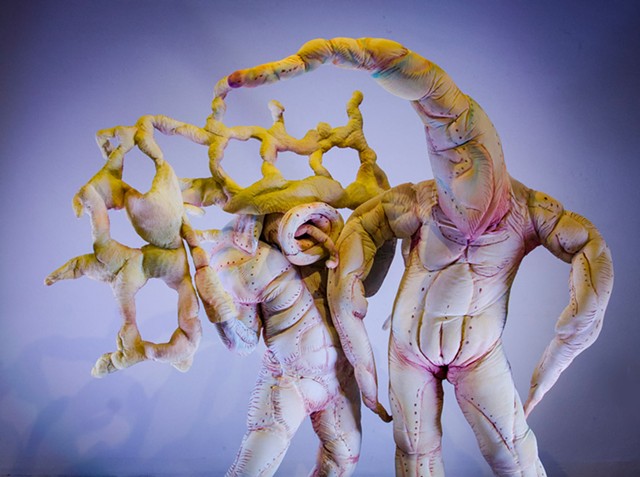
- Photo by Danae Kotsiras
The puppets and costumes featured in "Don't Blame Anyone" ("No Se Culpe a Nadie" in Spanish) are fantastical and imbued with a cryptic surrealism. The opera's creatures look a lot like tardigrades, those mysterious, microscopic animals colloquially known as "water bears," which can withstand long periods of starvation, extreme temperatures, exceedingly high pressures, and even dangerous amounts of ionizing radiation.
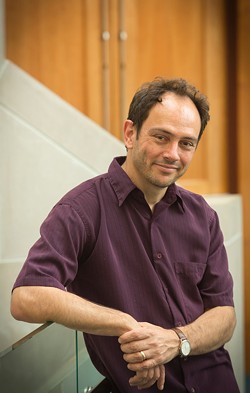
- PHOTO by Hanna Hurwitz
- Carlos Sánchez-Gutiérrez
While the visuals — somewhat similar in tone to those in the Guillermo del Toro film "Pan's Labyrinth" — are a little discomforting, they're also profoundly imaginative and fascinating. Adding to that the musical styles of both composers, the visceral combines with the otherworldly in a way that accentuates a sense of wonder, mysticism, and even dread.
This ambitious artistic endeavor benefits from the official involvement of the Mexican government — amid an American political landscape blanketed with the long shadow of Donald Trump-era, anti-immigrant discrimination and xenophobia. The operatic premiere begins to take on a major cultural significance in Rochester and beyond.
Before Sánchez-Gutiérrez and Zohn-Muldoon began teaching at Eastman, they knew one another in Mexico as aspiring young musicians. Coming up together, the two composers' ties to contemporary music were hazier than they are here in Rochester, where the performance of new music is prevalent due to Eastman School-affiliated ensembles like Musica Nova, Ossia, and Eastman BroadBand.
"This idea of art is a very local thing, because when we were growing up in our generation, the idea of contemporary music was something that was happening in Paris — it was Pierre Boulez in Paris," Zohn-Muldoon says. "And so now, I think the sense that is much more liberating, this idea of contemporary music is music that you make today and that you make true to your personal history."
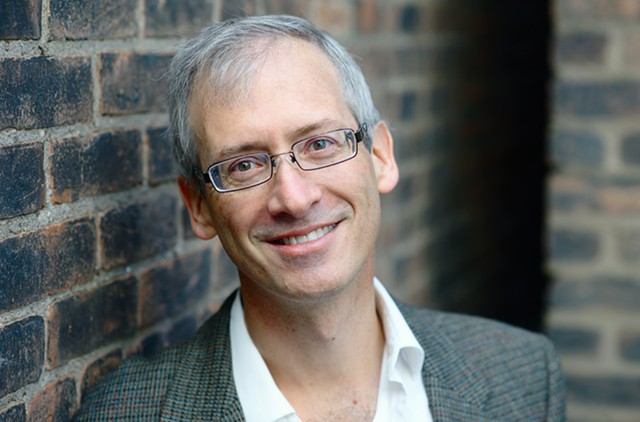
- PHOTO by Hanna Hurwitz
- Ricardo Zohn-Muldoon
The relationship between this personal history and the "American music" tradition, though not necessarily straight-forward, is nuanced. "I share the idea of 'Yes, if we are in America, we should write music that reflects what we do and who we are and where we are,'" Sánchez-Gutiérrez says. "And in that sense, you know, we are continuing that tradition, and we do believe that it is important to create music that is about our experience, whether it's American in the specific sense — you know, US-based — or Latin American or North American."
Mexico's legislature and cultural administration — the Mexican Chamber of Deputies and the Ministry of Culture, to be specific — allocated and distributed earmarked funds in order to finance the production of the opera here in Rochester. The Mexican Embassy (led by Alberto Fierro, the executive director of the Mexican Cultural Institute in Washington, DC) and Consulates (with New York City-based Consul General Diego Gomez, who plans to attend the Rochester premiere) provided additional support through its communication outlets to promote the work. The Mexican premiere of "Don't Blame Anyone" will take place on Thursday, November 24, at Guadalajara's Teatro Diana.
In a recent email interview, Fierro acknowledged the opera's significance during the turbulent debate on immigration and a volatile US presidential campaign. "The opera written and composed by two Mexican musicians and university professors shows that there are many very highly qualified Mexican immigrants in the US that contribute to the cultural and academic life of the United States," says Fierro, who also serves as the Mexican Embassy's Counsellor for Culture and Education in the US. "They work and collaborate with American institutions, and were able to produce a performance that will have binational transcendence, being financed and presented by institutions of both countries. There has been always a profound dialogue between Mexican and American artists and artistic institutions."
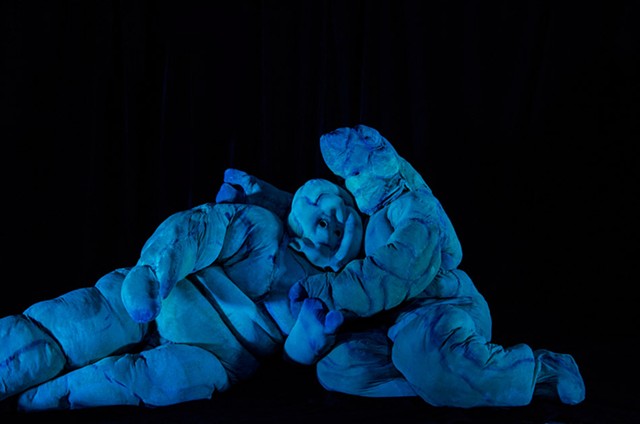
- Danae Kotsiras
Antonio Camacho and his non-profit organization El Arte de los Titeres — of which the puppetry group La Coperacha is a part — provided "hands-on" supervision and leadership, without which the opera would never have been produced.
As for the presentation of "Don't Blame Anyone," with its myriad artistic mediums — music, dance, drama, puppetry, visual art, and poetry — and its "meta" plot, Zohn-Muldoon sums it up best: "It's a story about artists. 'How do you create art?'" he says.
Initially the composers pursued an external narrative, but soon found that it was far more interesting for the opera to become a kind of artistic memoir. "In a way, the opera is about this experience, about three guys getting together, trying to come up with a story," Zohn-Muldoon says. "That's the story."
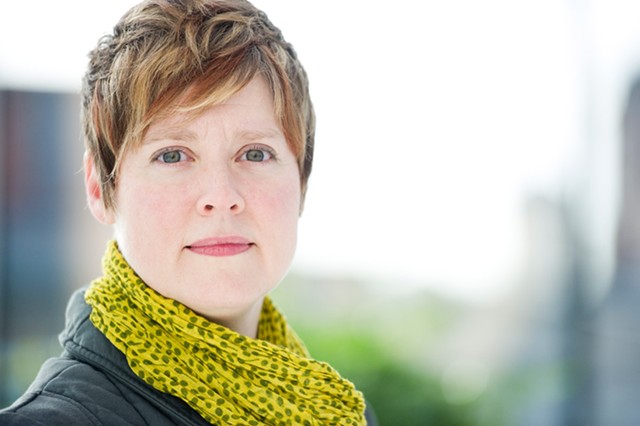
- PHOTO by Hanna Hurwitz
- Soprano Tony Arnold
The third guy in that story is Darren Stevenson, the co-founding artistic director of PUSH Physical Theatre. Stevenson, Zohn-Muldoon, and Sánchez-Gutiérrez would get together, look through original drawings by Mexican illustrator José Ignacio Solórzano, "and based on what each of us brought onto the table — the poetry that we individually liked, the imagery that we all could contribute that was close to us — you know, little by little, by having these gatherings, an actual work emerged," Sánchez-Gutiérrez says.
"It was very, very seamless, you know," he adds. "We would just talk about these things, and Ricardo would mention a line of poetry by Raúl Aceves, and then automatically Darren would get up and mime it, act it out for us. And then that would give me, for example, the idea for a musical setting that worked with it. It really was created that way, absolutely."
Sánchez-Gutiérrez is quick to distinguish between merely coming up with an idea and actually bringing that idea to fruition. "Anyone can come up with ideas. Ideas are not hard to produce," he says. "Courage is very important for me. Courage as understood as forcing yourself to be in the same room with inspiration or with ideas that are sometimes scary and dangerous."
Beyond the creative process itself, the human takeaway from the opera — and how it was written — is beautiful, direct, and deceptively simple. Thinking about the social importance of "Don't Blame Anyone," Stevenson remembers a trip he took to Estonia that resonated with him. There, he learned about the Baltic Chain, a peaceful protest in August 1989, in which people from three different Baltic States (Latvia, Estonia, and Lithuania) joined hands, forming a human chain that stretched more than 400 miles in solidarity against the political control of the Soviet Union.
"I came back, and I recall thinking, 'What do you do to defeat this sort of fear of the other, fear of foreigners, fear of people taking our jobs, taking our women, taking our — you know, whatever the hell we're afraid of — and what do you do?'" Stevenson says. "We think, 'Well we just need to understand other people more.' You don't. You don't need to. You'll understand them if you start by reaching out your hand and hold hands with someone that is very different. And that's all you need."
Similarly, Sánchez-Gutiérrez recently came across a poignant article about current xenophobia in European countries, and a specific quote stood out to him: "'In the arithmetic of societies, addition is always preferable to subtraction.' And I think that's actually a beautiful way to look at it. Very simply put, and it's true."
